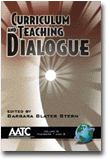
Curriculum and Teaching Dialogue
Vol. 8 # 1 & 2
Edited by:
Barbara Slater Stern, James Madison University
A volume in the series: Curriculum & Teaching Dialogue. Editor(s): Chara Haeussler Bohan, Georgia State University. John L. Pecore, University of West Florida. Franklin S. Allaire, University of Houston-Downtown.
Published 2006
Editorial Review Board: Lynne Bailey, University of North Carolina—Charlotte. Robert Boostrom, University of Southern Indiana. Monica Brown, University of the West Indies. Susan Brown, University of Central Florida. India Broyles, University of New England. Lynn M. Burlbaw, Texas A & M University. Jennifer Deets. Robert Donmoyer, University of San Diego. Moira Fallon, SUNY—College at Brockport. Lyn Forester, Doane College. Jeffrey Kaplan, University of Central Florida. J. Randall Koetting, Marian College. Karen Riley, Auburn University at Montgomery. Judith J. Slater, Florida International University, Julia D. Sweeny, James Madison University. Jeanne L. Tunks, University of North Texas.
Editorial Advisory Board: Michael Apple, University of Wisconsin—Madison. Thomas Barone, Arizona State University. D. Jean Clandinin, University of Alberta, Canada. Elliot Eisner, Stanford University. Steve Selden, University of Maryland at College Park. William F. Pinar, University of British Columbia.
CONTENTS
The President’ Message, William Veal. The Editor’s Notes: Exploring Ways We View the World: Personal, Professional, Relational, Political . . ., Barbara Slater Stern. PART I. Musings on the Margins: Curriculum and Teaching in an Age of School Reform, Cheryl Craig. Making Intuition Practical: A New Theoretical Framework for Education, Kevin Cloninger. Teachers’ (K-5) Perceptions of Student Behaviors During Standardized Testing, Deborah Landry. Reading Purposes: An Examination of the Texas Essential Knowledge and Skills for Sixth Grade Reading With Respect to Foshay’s Curriculum Matrix, Kelly Reidt. Doing Something Different: Envisioning and Enacting Mathematics Curriculum Alternatives, Stacy Reeder, Darlinda Cassel, Anne Reynolds, and Jayne Fleener. The Word and the World: A Lesson in Critical Literacy and its Impact on Student Achievement and Self Esteem, Linda Kalbach and Lyn Forester. Enacting Curriculum and Teaching Theory in Contexts of Countervailing Thought: The Cases of John Dewey and Accelerated Schools, Christine Finnan. University Curriculum Reforms That Revitalize the Commons, Chet Bowers. Guiding Principles for Environmentally Sustainable Education, Nancy Van Kannel-Ray. Encapsulating the Environment: A Case for a Place-Based Curriculum, Andrew Kemp. PART II. Curriculum Leadership for the Jim Crow South: The General Education Board Between the Two World Wars, Matthew D. Davis. The Emergence of Ida B. Wells, William F. Pinar. The Gift of a Curriculum Method: Beginning Notes on William F. Pinar, Douglas McKnight. Help Without Giving Advice: Pinar, Curriculum Studies, and Canada, Terry Carson. Weaving a Tapestry of Multicultural Education: A Geoethnographic Mosaic of a Day in the Life, Richard Biffle. Relational Responsibilities of Narative Inquiries, Marilyn Huber, D. Jean Clandinin, and Janice Huber. Metaphors and Cross-Cultural Stories of Learning to Teach, Yi-Ping Huang and Sibel Ariogul. A Community of Care in a Teacher Education Supervisory Seminar, Barri Tinkler. Capturing the Journey: A Case of Preparing a Middle Level Teacher, Micki Caskey. Recognizing Joy in Teaching, Thomas Poetter. About the Authors.
-
Paperback978-1-59311-576-0
Web price: $45.04 (Reg. 52.99)
-
Hardcover978-1-59311-577-7
Web price: $80.74 (Reg. 94.99)
- eBook9781607528005

-
 Curriculum and Teaching Dialogue
Volume 24, Numbers 1 & 2, 2022
Curriculum and Teaching Dialogue
Volume 24, Numbers 1 & 2, 2022
-
 Curriculum and Teaching Dialogue
Volume 25, Numbers 1 & 2, 2023
Curriculum and Teaching Dialogue
Volume 25, Numbers 1 & 2, 2023
-
 Curriculum and Teaching Dialogue
Vol. 19 # 1 & 2
Curriculum and Teaching Dialogue
Vol. 19 # 1 & 2
-
 Curriculum and Teaching Dialogue
Vol. 20 # 1 & 2
Curriculum and Teaching Dialogue
Vol. 20 # 1 & 2
-
 Curriculum and Teaching Dialogue
Vol. 21 # 1 & 2
Curriculum and Teaching Dialogue
Vol. 21 # 1 & 2
-
 Curriculum and Teaching Dialogue
Vol. 22 # 1 & 2
Curriculum and Teaching Dialogue
Vol. 22 # 1 & 2
-
 Curriculum and Teaching Dialogue
Vol. 23 # 1 & 2
Curriculum and Teaching Dialogue
Vol. 23 # 1 & 2

